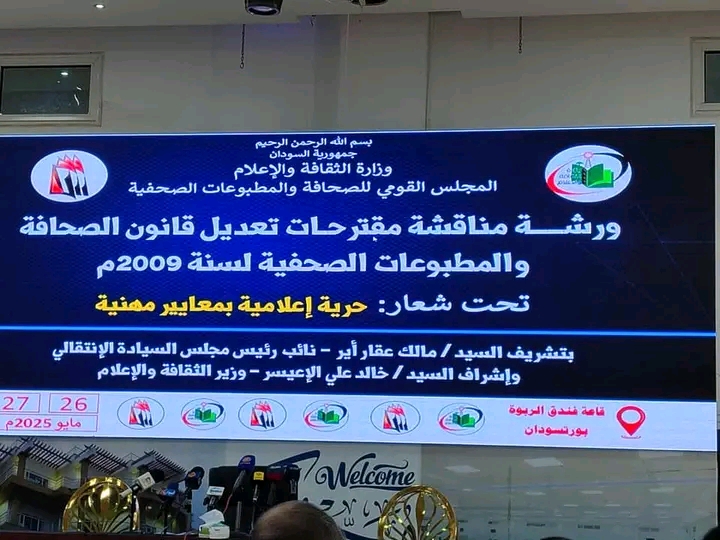The Sudan Media Forum today voiced deep concern over the outcomes of a recent workshop held in Port Sudan on May 26-27, 2025, which discussed proposed amendments to the Press and Publications Act of 2009. While acknowledging efforts to develop the media environment, the Forum believes that many of the recommendations pose a significant threat to press and media freedom in Sudan, undermining the fundamental role of the fourth estate as a societal watchdog.
Despite references to “international standards” and “freedom of expression,” these recommendations inherently carry the seeds of restricting, rather than expanding, these freedoms. In fact, many directly contradict international conventions Sudan has signed and ratified regarding the guarantee and protection of free expression. The press and media in Sudan don’t need a new law that adds restrictions. Instead, they need an independent body formed by civil society from the journalistic, legal, and academic communities, operating within a democratic legal framework aimed at strengthening and protecting freedom of expression for all media institutions.
Fundamental Concerns Regarding the Proposed Recommendations
Overuse of Ambiguous Terms: The excessive use of terms like “national security requirements,” “protection of societal values,” “religious and moral foundations,” and “proper practice of information use” as controls for journalistic work, without precise and clear definitions, opens the door wide to arbitrary interpretations. This can be used as a pretext to suppress critical and independent voices and impose suffocating self-censorship on journalists, hindering their ability to uncover facts and hold officials accountable.
Creation of Controlling Bodies: Recommendations to establish a “professional council to regulate journalistic activity” and expand the “National Press Council’s” powers to include electronic media, alongside creating an “administrative coordination system for managing and registering electronic publication platforms and practitioners,” raise deep concern. This is particularly alarming given the inclusion of “technical bodies of the regular forces” within a “coordination mechanism for governing electronic publication.” Involving security and military agencies in regulating media directly contradicts the most basic principles of press independence and its protection from direct government interference, turning these bodies into tools of control rather than professional regulation.
Vague Quality Control: Discussions of “monitoring electronic publication platforms and media to ensure content quality” and linking newspaper licensing to “quality standards” without clear definitions or independent application mechanisms, could become tools for controlling content and limiting media pluralism. This approach threatens to transform the media into a tool for promoting a single narrative instead of being a diverse platform reflecting societal views.
The Sudan Media Forum believes that if these approaches are adopted in the new law, they will only lead to a restricted and controlled media. Such a media would be unable to fulfil its vital role in uncovering facts, holding officials accountable, enlightening public opinion, and contributing to building a democratic, free, and prosperous Sudan.
Call for an Independent Media Body and Self-Regulation
The Sudan Media Forum emphasizes that the only way to guarantee media freedom and independence in Sudan, and to achieve a true balance between freedom and responsibility, lies in establishing an independent body to regulate media affairs. This body must:
Enjoy full independence guaranteed by law: This includes financial, administrative, and decision-making independence, free from any domination or interference from the executive authority, security agencies, or any partisan or political entity.
Be formed from professional competencies known for integrity and expertise: This should be achieved through a transparent and participatory selection mechanism that includes genuine representatives of the journalistic body, academics, legal professionals, and civil society organizations.
Have its primary mandate to protect and promote freedom of expression, press, and media pluralism: It should also support the development of professional and ethical standards in consultation with journalists themselves, and facilitate the public’s right to access information.
Not exercise a supervisory role over content or prior licensing of journalists: Instead, it should work to provide an enabling environment for free and responsible journalistic work.
The independence of the fourth estate isn’t a luxury; it’s an imperative necessity for any democratic system striving for transparency, accountability, and development.
Clear Demands to Ensure Press Freedom
From this standpoint, the Forum demands:
The Ministry of Information must cease interfering in matters of press freedom and expression. Decisions related to media must be issued by independent and professional bodies.
The journalistic and media community must establish frameworks for regulating their activity: This should be in accordance with known international standards for press regulation, and by adhering to codes of journalistic ethics created and written by journalists themselves, away from any external interference. This ensures that professional standards originate from within the profession, strengthening self-responsibility and professionalism.
The Sudan Media Forum calls upon all active forces in Sudanese society and decision-makers to recognize the danger of the current proposals. We urge them to work seriously towards formulating a legal and regulatory framework that protects press freedom and ensures its independence, foremost among which is the establishment of a truly independent body that serves as a safety valve for the right to knowledge and free expression.
